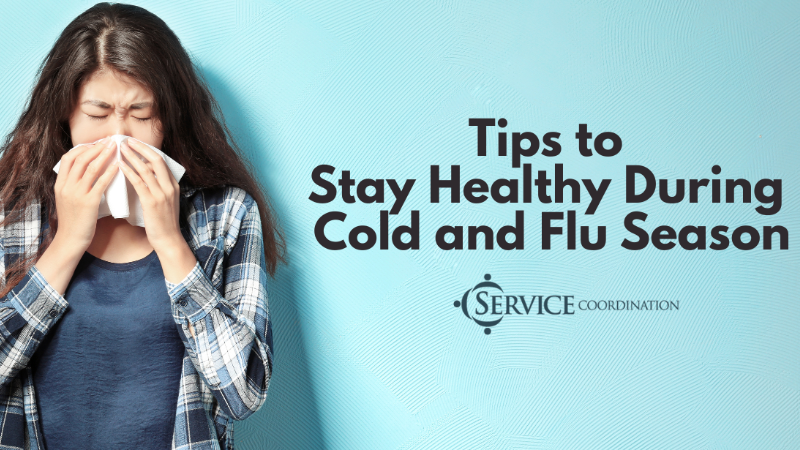
As the weather cools and we spend more time indoors, respiratory and stomach viruses tend to spread more easily. Last year alone, the CDC estimated that at least 1 million people were hospitalized and more than 70,000 died from respiratory illnesses such as the flu, COVID-19, RSV, and pneumonia.
At Service Coordination, we care deeply about the health and safety of the people we serve and know that illness can quickly impact not only personal well-being but also access to care, independence, and daily routines. Understanding the risks—and how to prevent them—can make a big difference during the fall and winter months.
Common Seasonal Illnesses
Some of the most common and burdensome illnesses this time of year include:
- Influenza (Flu)
- COVID-19
- Respiratory Syncytial Virus (RSV)
- Common Cold and Other Viruses
- Pneumonia
- Norovirus (Stomach Virus)
While anyone can get sick, those at higher risk for severe illness or complications include young children, older adults, people with chronic medical conditions, individuals with weakened immune systems, and those who are pregnant.
Prevention: Your Best Defense
Taking proactive steps can help reduce your risk of getting sick—and keep your community healthier too.
- Get Vaccinated
Vaccines are available to protect against Flu, COVID-19, RSV, and Pneumococcal pneumonia. Talk to your healthcare provider about which vaccines are right for you. - Wash Your Hands Often
Scrub your hands for at least 20 seconds with soap and water—especially before eating, after using the bathroom, and after coughing or sneezing. When soap and water aren’t available, use a hand sanitizer with at least 60% alcohol. - Cover Coughs and Sneezes
Use a tissue or your elbow to cover your mouth and nose. Avoid using your hands to prevent spreading germs to others. - Keep Your Distance When Sick
Avoid close contact with others if you’re not feeling well. If you must go out, consider wearing a mask to help protect those around you. - Keep Your Environment Clean
Disinfect high-touch areas frequently—phones, doorknobs, light switches, keyboards, and remote controls. In the kitchen and bathroom, clean faucets, handles, counters, and towels often using EPA-approved disinfectants effective against multiple viruses, including norovirus. - Boost Your Immune System
A strong immune system is your body’s best defense. Eat nutritious foods, exercise regularly, stay hydrated, get enough sleep, and avoid smoking.
Supporting Health and Wellness in Our Communities
Service Coordination is committed to supporting individuals and families in maintaining their health and independence year-round. Whether it’s connecting clients to healthcare resources, coordinating services, or providing education, we’re here to help ensure everyone can thrive—especially during cold and flu season.
If you’re feeling unwell, it’s important to take precautions to protect yourself and others. The CDC recommends staying home until you’ve been fever-free for at least 24 hours without medication and are feeling better. For stomach viruses, stay home for 48 hours after symptoms stop to prevent spreading germs.
Treatment and When to Seek Care
If you become ill:
- Follow your healthcare provider’s advice for testing and treatment.
- Get tested when appropriate so you can receive the proper care and avoid spreading illness.
- Antiviral medications may help treat certain viral infections; antibiotics only work for bacterial infections.
- Rest and stay hydrated to support recovery.
- Seek emergency care right away if you experience severe symptoms, especially trouble breathing or chest pain.
